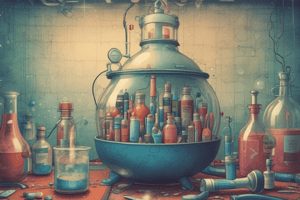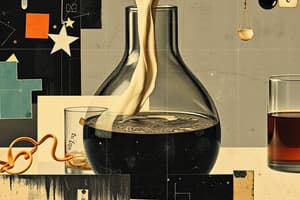Podcast
Questions and Answers
What is the substance that is dissolved in a solution called?
What is the substance that is dissolved in a solution called?
- Mixture
- Solvent
- Solute (correct)
- Concentration
What does 'aq' represent in a chemical equation?
What does 'aq' represent in a chemical equation?
- Acidic quality
- Aqueous solution (correct)
- Air quality
- Alkaline quantity
Which term refers to the amount of solute in a given amount of solvent?
Which term refers to the amount of solute in a given amount of solvent?
- Concentration (correct)
- Particle density
- Solvent ratio
- Dissolution factor
Which type of compounds will generally dissolve in water due to its polarity?
Which type of compounds will generally dissolve in water due to its polarity?
In chemistry, what do we call two liquids that do not dissolve in each other?
In chemistry, what do we call two liquids that do not dissolve in each other?
Which of the following is NOT a characteristic of a solution?
Which of the following is NOT a characteristic of a solution?
What happens to the solubility of solid substances in water as temperature increases?
What happens to the solubility of solid substances in water as temperature increases?
Which factor can affect the rate at which a species dissolves?
Which factor can affect the rate at which a species dissolves?
In which type of solution can no more solute be dissolved?
In which type of solution can no more solute be dissolved?
What happens to gas molecules when the temperature is increased according to the text?
What happens to gas molecules when the temperature is increased according to the text?
Which type of molecules surround positive and negative ions during the dissolving process?
Which type of molecules surround positive and negative ions during the dissolving process?
What type of solution is at equilibrium and cannot dissolve any more solute?
What type of solution is at equilibrium and cannot dissolve any more solute?
Is oil a polar compound or a non-polar compound?
Is oil a polar compound or a non-polar compound?
How does temperature affect the solubility of solids?
How does temperature affect the solubility of solids?
What effect does increasing pressure have on gas solubility?
What effect does increasing pressure have on gas solubility?
How does surface area affect the rate of solubility?
How does surface area affect the rate of solubility?
Are non-polar solvents able to dissolve ionic solutes?
Are non-polar solvents able to dissolve ionic solutes?
Why do gases tend to escape from solution as temperature increases?
Why do gases tend to escape from solution as temperature increases?
How does stirring affect the rate of dissolving?
How does stirring affect the rate of dissolving?
What is the relationship between solute particles and freezing point depression/boiling point elevation?
What is the relationship between solute particles and freezing point depression/boiling point elevation?
Which method involves separating substances based on differences in physical properties like boiling point?
Which method involves separating substances based on differences in physical properties like boiling point?
How does temperature generally affect the solubility of solid substances in a solvent?
How does temperature generally affect the solubility of solid substances in a solvent?
What does adding a solute to a solvent do to its freezing point?
What does adding a solute to a solvent do to its freezing point?
In terms of boiling point elevation, which type of solute has the greatest effect?
In terms of boiling point elevation, which type of solute has the greatest effect?
Flashcards are hidden until you start studying
Study Notes
Polar and Nonpolar Molecules
- Polar molecules are asymmetrical, having poles, while nonpolar molecules are symmetrical with no poles.
Solubility Rules
- LiOH, Cu(NO3)2, AgCl2, MgS, NaS2, and KOH are all soluble (aq) in water.
- Solubility is the maximum amount of solute that can be dissolved in a solvent.
Factors Affecting Solubility
- Increasing temperature generally increases solubility for solids, but decreases solubility for gases.
- Pressure affects the solubility of gases, with increasing pressure forcing more gas into solution.
- Type of solvent and solute also affects solubility, with polar solvents dissolving polar and ionic solutes, and non-polar solvents dissolving non-polar and covalent solutes.
Dissolving Process
- Polar H2O molecules surround positive and negative ions, breaking apart crystal lattices, and releasing energy.
- The dissolving process takes energy to break bonds, and energy is released during dissolving.
Saturated and Supersaturated Solutions
- A saturated solution is at equilibrium, where particles are dissolving and precipitating at the same rate.
- A supersaturated solution contains more solute than it can hold at a given temperature.
Factors Affecting Rate of Solubility
- Temperature affects the rate of solubility, with increasing temperature increasing kinetic energy and diffusion.
- Surface area and stirring also affect the rate of solubility, with larger surface areas and more agitation increasing the opportunity for interaction between solute and solvent.
Solutions and Concentration
- A solution is a homogeneous mixture of two or more substances in the same physical state.
- The concentration of a solution is the amount of solute in a given amount of solvent.
- Soluble substances dissolve in water, while insoluble substances do not.
Calculations and Properties of Solutions
- Molarity, gram per liter, and parts per million can be used to calculate the concentration of a solution.
- Freezing point depression and boiling point elevation occur when solutes are added to solvents, disrupting crystallization and evaporation.
Chromatography and Distillation
- Chromatography separates solutions into individual substances using differences in polarity.
- Distillation separates solutions into individual substances using differences in physical properties.
Studying That Suits You
Use AI to generate personalized quizzes and flashcards to suit your learning preferences.




